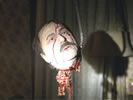Eye For Film >> Movies >> Seed (2007) Film Review
Director Uwe Boll (a man synonymous with terrible filmmaking) has obviously done his research on exploitation marketing. Back in the heyday of grindhouse cinema, films would often base their advertising on the promise of shocking real footage. This footage often ended up being no more than 30 seconds long and usually just inserted into the beginning or end of an already finished film, with no real explanation for its existence.
True to the form, Seed opens with a warning of graphic and disturbing footage of real events, placed in the film "to make a statement about humanity". The footage itself, a few shots of animals being brutalised and tortured, follows immediately after. The titular villain, a serial killer who murdered an impressive 666 people in six years, watches it all on his TV.

This scene is never brought up, referred to, or referenced at any other point in the film. Any statements about humanity it supposedly makes are entirely lost. As with its exploitation forbearers, the footage is put in for no other purpose than to shock. And in a post-internet age, a film really has to provide a lot more than that in order to justify itself. Needless to say, Seed doesn't.
After the 'shocking' footage is dispensed with, another block of text informs us about a state law whereby a prisoner sentenced to death by electric chair who takes three jolts and lives, must be set free. Ignoring the fact that it's a ridiculously false law that would never be carried out in real life, this offers a potentially interesting scenario for a prologue in a slasher film. You can practically see the nubile teens sitting round the campfire telling the legend of the indestructible killer who still roams the woods for victims.
This is no prologue though. Despite telling us what happens to Seed in this opening text, it takes a full half of the film's running time for this to happen. Once Seed survives the three sittings on the chair, a decision is made to declare him dead anyway, and bury him in the flimsiest coffin in a shallow grave round the back of the prison. And of course he breaks out to stalk and kill his would be executioners.
Rather than providing a welcome relief from the tedium of the rest of the film, these murders mainly happen in almost complete darkness, rendering them pointless. The darkness is a problem with the film as a whole. The cinematographer has aimed for dramatic shadows and contrast, but instead ended up with whole scenes in almost pitch darkness. Rather than being frightening, it's a lot like staring at a black piece of paper, and almost as much fun. When the veil of darkness is lifted, the pallet of the film goes from black to brown, coming off like a cut-price Zodiac.
The similarities to Fincher's film don't end there. Like Zodiac, Seed has its fair share of obsession, which makes for the oddest plot development. The cop in charge of the capture of Seed, Detective Matt Bishop (Michael Paré, playing a character so forgettable I had to look up his name), endlessly agonises over whether it was morally right to bury Seed alive rather than letting him walk free.
Rather than a potentially interesting debate on capital punishment, this leads to Bishop wondering if he should have upheld a plainly ridiculous law. This carries on even when Seed himself returns from the grave to resume killing, making the whole plot thread redundant. Of course they should have killed him, letting him go wouldn't make a single bit of sense.
The list of faults with Seed are almost endless: the characters are uninteresting and forgettable, the dialogue is almost non-existent, the plot is riddled with holes. In short, this is not a good movie (the lowest rating on Eye For Film is one star, but if I could I would give it less).
Of course, the exploitation flicks of the Seventies aren't considered 'good' in a conventional sense. They were often characterised by long dull sequences where nothing much happened. But, and this is important, these were interspersed with flashes of brutal violence, sex and occasional brilliance, usually resulting in an entertaining hour and a half. With Seed, Boll has the boring part down, but has forgotten to include the meat, and has therefore committed the cardinal sin of being boring.
Reviewed on: 07 Feb 2009



















